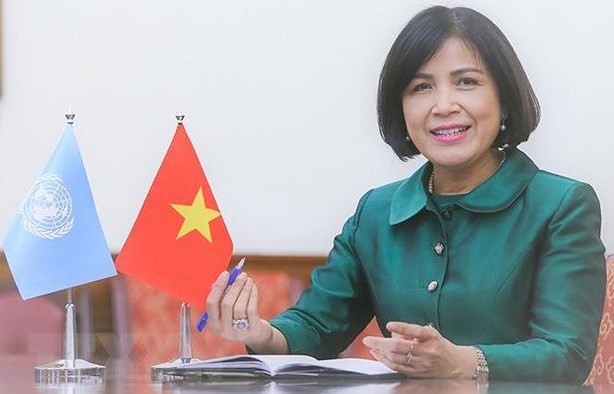 Ambassador Le Thi Tuyet Mai, Permanent Representative of Vietnam to the United Nations, the WTO, and other international organisations in Geneva (Photo: VNA)
Ambassador Le Thi Tuyet Mai, Permanent Representative of Vietnam to the United Nations, the WTO, and other international organisations in Geneva (Photo: VNA)–
Ambassador Le Thi Tuyet Mai highlighted Vietnam’s wish to learn from developed
countries’ experience in operating a circular economy and developing sustainably while
addressing a recent virtual meeting of the World Trade Organisation (WTO).
The teleconference on
circular economy, economic diversification, and aid for trade took place as
part of the aid-for-trade work programme for 2020 - 2022 of the WTO Committee
on Trade and Development.
Speakers included
representatives of some international organisations like the WTO, the UN
Industrial Development Organisation (UNIDO), the Organisation for Economic
Cooperation and Development (OECD), the Asian Development Bank (ADB), and the
Royal Institute of International Affairs of the UK (Chatham House).
Presenting Vietnam’s
viewpoint and experience, Ambassador Mai, Permanent Representative of the country to the United Nations, the WTO, and other international organisations in
Geneva, said in its socio-economic development strategy for 2021 - 2030,
Vietnam identified building a circular economy model as one of the orientations
and solutions for fast and sustainable development.
Some policies and mechanisms
promoting factors of a circular economy have been included in the country’s
guidelines, policies, and laws about environmental protection and the national
action plan to implement the 2030 Agenda for Sustainable Development.
In particular, they have been
institutionalised in the Law on Environmental Protection, the national green
growth strategy, and the national action plan on sustainable production and
consumption, she went on.
She emphasised that since the
Doi moi (Renewal) period began in 1986, Vietnam has continually paid attention
to the combination of economic development with environmental protection,
sustainable use of natural resources and production materials, and realisation
of the Sustainable Development Goals (SDGs).
These policies have proved
effective, as seen in many enterprises succeeding in applying clean production
models, she said.
Mai also pointed out major
challenges to Vietnam during the transition from the traditional economy to a
circular one, adding that the country wishes to learn from developed countries’
experience in how to operate a circular economy and develop sustainably.
Stepping up international
economic integration via commitments under the WTO and recently inked trade
agreements will help Vietnam promote the building of a circular economy,
achieve the SDGs, and bring about benefits to its people, the ambassador said./.